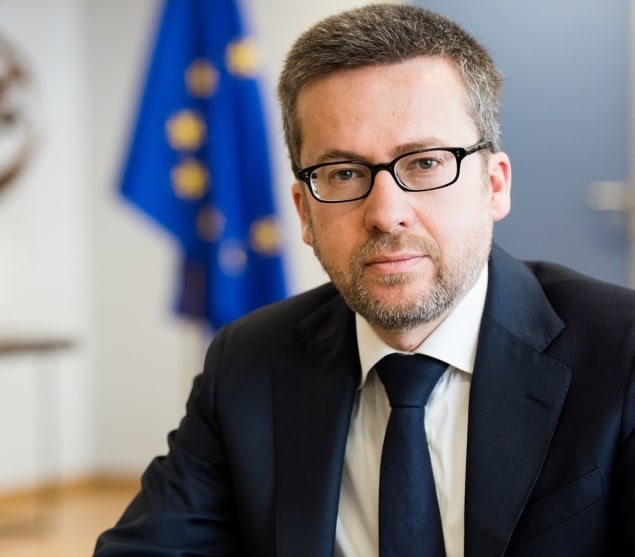The European Commission is proposing to spend €100bn on science over seven years from 2021, but will the UK see any of the cash now it is quitting the EU? Michael Banks and Michael Allen report

The European Commission (EC) has called for €100bn to be spent on Horizon Europe – the region’s next seven-year framework programme, which runs from 2021 to 2027. The successor to the €80bn Horizon 2020, the budget for Horizon Europe will need to be ratified by the European parliament and member states before it can come into force. Outlining the programme in a speech last month, Carlos Moedas, European Union (EU) commissioner for research, science and innovation, noted that Horizon 2020 had been one of the EU’s success stories.“The new Horizon Europe programme aims even higher,” he said. “As part of this, we want to increase funding for the European Research Council to strengthen the EU’s global scientific leadership, and reengage citizens by setting ambitious new missions for EU research.”
As part of Horizon Europe, the EC is proposing a new European Innovation Council to “modernize funding for ground-breaking innovation in Europe”. It will aim to bring the most promising high potential and breakthrough technologies from lab to market application, and help the most innovative start-ups and companies scale up their ideas.
Another change to the funding programme regards international partners, dubbed “third countries”. In Horizon Europe, non-EU third countries, such as Canada, Japan and South Africa, will pay as they go, providing they have a free-trade agreement with the EU. But crucially they will not get out more than they put in. The new rules will not apply to countries such as Norway and Iceland, which belong to the European Economic Area.
The UK’s possible third-country status means it could lose access to a lot of extra funding. Indeed, UK scientists have done exceptionally well from EU research programmes. Estimates suggest the UK contributed €5.4bn between 2007 and 2013, but got back €8.8bn.
Close association
The Horizon Europe announcement came after the UK government noted that it would like to “fully associate” with European science programmes after the country leaves the EU. In a speech at Jodrell Bank in Cheshire on 21 May, UK prime minister Theresa May unveiled the government’s vision for EU–UK scientific co-operation. She stated that the UK is willing to pay for a “full association” with Horizon Europe and “close association” of the European Atomic Energy Community (Euratom). “I want the UK to have a deep science partnership with the EU,” she noted. “In return, we would look to maintain a suitable level of influence in line with that contribution and the benefits we bring.”
Not everyone is optimistic. The Nobel laureate Andre Geim from the University of Manchester doubts that the UK government can deliver the proposed plan. “The gang of 27 will place conditions favourable for their own countries,” he told Physics World. “Things for UK science are expected to turn bad for a generation, after the formal Brexit takes place.”
Scientists are particularly concerned about the UK’s future relationship with Euratom. The UK government had ruled out continued involvement with it as members are subject to the jurisdiction of the Court of Justice of the European Union (CJEU). However, the UK’s membership of the ITER fusion experiment is through Euratom, while the Joint European Torus (JET) at the Culham Centre for Fusion Energy (CCFE) in Oxfordshire, is largely funded by Euratom.
To get around the impasse, the UK states that it will now respect the remit of the CJEU when it comes to participating in EU programmes. “Reaching such an association would allow the continuation of all aspects of our programme,” notes Ian Chapman, chief executive of the UK Atomic Energy Authority, which operates the CCFE.
Analysis: The UK is already losing out
Brexit was always going to be mostly bad news for British scientists. The UK currently gets around 4% of its science funding from the European Union (EU), but wins far more back in return than it gives. Those benefits could evaporate when the UK exits the EU in March 2019 if the UK becomes a “third country” in Horizon Europe. As the European Commission announced last month, third countries will receive only what they put in from the €100bn pot. That seems fair from an EU perspective – why should the UK be out of the club but then get all the benefits?
While the political wrangling will no doubt continue until the UK has struck a final deal, it’s hard to see any scenario where UK science will benefit. UK university departments that are particularly adept at tapping into European funds will either have to find funding elsewhere or scale back activity in areas.
The space sector is likely to be hit too. There is already a fall-out regarding the UK’s participation in the Galileo satellite navigation system. The European Space Agency has approved the procurement of the next batch of spacecraft but with no deal reached between the UK and the EU, British firms are bound to find it harder to win any contracts. The impact of Brexit is already starting to be felt.
Michael Banks is news editor of Physics World magazine



